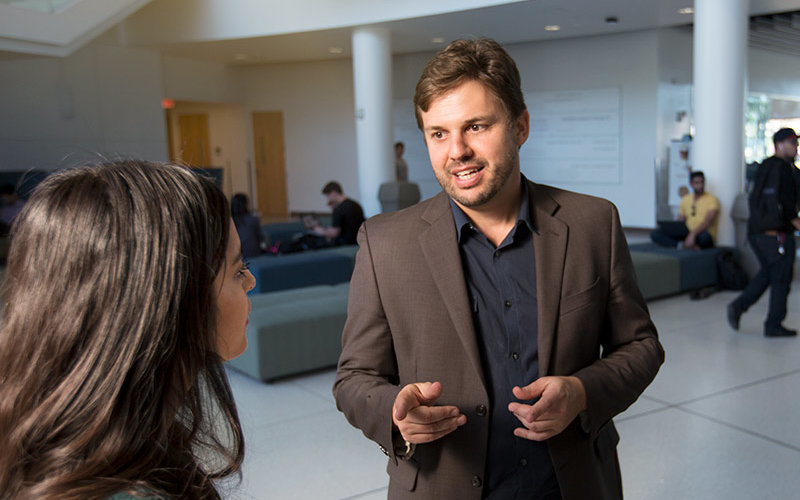
Lucero Sosa, the eldest of six children, planned to get a job to help support her family after graduating from Santa Ana’s Century High School. Instead, a school counselor changed her mind about going to college.
“If it weren’t for my counselor, I don’t think I would be here right now,” says Sosa, a human services major and the first in her family to attend a four-year university.
As a freshman, Sosa felt isolated and unconnected with campus life. She began taking courses with faculty mentor Julián Jefferies, setting her college journey in a new direction. Through the courses, Sosa, now a junior, was introduced to a learning community that exposed her to internship and career possibilities, campus activities and educational opportunities abroad. She also became one of Jefferies’ research assistants.
Jefferies, assistant professor of literacy and reading education, wants to open up the academic world to Latino students whose parents didn’t earn a college degree. At Cal State Fullerton, 57 percent of bachelor’s degree recipients are first-generation university graduates.
Jefferies’ research centers on the influence of a learning community for first-generation college students — how studying abroad, research experiences, mentoring, tutoring and career advising shape a student’s education and college success. Jefferies, a first-generation student from Argentina, calls this the “hidden curriculum,” which these students often don’t take advantage of, due to lack of support and knowledge in navigating the University, as well as cultural barriers.
“I’m trying to find out if these kinds of experiential learning have an effect on whether students become more engaged on campus, and whether they help students to graduate, pursue graduate school and prepare them for the workforce,” explains Jefferies, who also studies the daily life of undocumented youth and received a Fulbright award to study adolescent migrants who returned to Mexico.
For his study, students take four of his courses, which address social, political, cultural and economic conditions underrepresented and immigrant students face, and prepares them for study-abroad experiences in Puerto Rico and Guadalajara. The classes embrace service-learning, career development and research experiences.
Jefferies’ ongoing research shows that students participating in the learning community express a sense of belonging and feel welcome on campus, are more apt to participate in student clubs and organizations, and can better relate to peers.
Sosa can attest to the benefits. She has studied in Puerto Rico, Guadalajara and Baja California, is involved with the McNair Prep Academy — scholars interested in graduate studies — and serves as an Abrego Future Scholars ambassador, a scholarship program to increase college participation of first-generation and underrepresented students. She also aspires to earn a doctorate.
“Being in a learning community, studying abroad and doing research has helped me realize that the world is so much bigger than I thought,” she says. “I now have opportunities I was not seeing.”